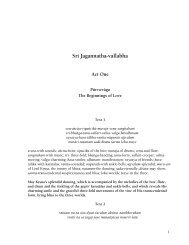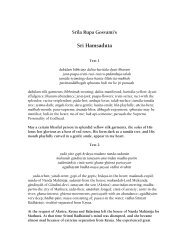Srimad Bhagavatam, Volume 3
Srimad Bhagavatam, Volume 3
Srimad Bhagavatam, Volume 3
Create successful ePaper yourself
Turn your PDF publications into a flip-book with our unique Google optimized e-Paper software.
Ananto—immeasurable, Mahad—great, Gunatwat—on account of such<br />
attributes, Yam—whom, Ananta—by the name, Ahu—is called.<br />
What to say about those who under the direction of great devotees chant<br />
the holy name of the unlimited Who has unlimited potency. The<br />
Personality of Godhead being unlimited in potency and trascendental by<br />
attributes, is called the Ananta (unlimited).<br />
The Dwijabandhu class of men or the less intelligent uncultured members<br />
born of higher castes, do put forward many arguments against the principle of<br />
lower caste man's becoming a Brahmin even in this life. They argue that birth<br />
in the family of Sudras or less than the Sudras, is made possible by one's<br />
previous sinful acts and therefore one has to complete the terms of<br />
disadvantages due to lower birth. And to answer these false logicians, <strong>Srimad</strong><br />
Bhagwatam asserts that one who chants the holy name of the Lord under the<br />
direction of pure devotees can at once get free from the disadvantages due to<br />
lower caste birth. A pure devotee of the Lord does not commit any offence<br />
while chanting the holy name of the Lord. There are ten different kinds of<br />
offences in the matter of chanting the holy name of the Lord and to chant the<br />
holy name of the Lord under the direction of a pure devotee means<br />
offenceless chanting. Offenceless chanting of the holy name of the Lord is<br />
transcendental and, therefore, such chanting of the holy name can at once<br />
purify one from the effects of all kinds of previous sins. This offenceless<br />
chanting means that one has fully understood the transcendental nature of the<br />
holy name and thus surrendered unto the Lord. Transcendentally the holy<br />
name of the Lord and the Lord Himself is identical as Absolute. Such<br />
offenceless holy Name of the Lord is as powerful as the Lord. The Lord is all<br />
powerful Personality of Godhead and He has innumerable Names which are<br />
all non-different from Him and are equally powerful also. In the last word of<br />
the Bhagwat Geeta the Lord asserts that any one who surrenders fully unto<br />
Him, is protected from all sins by the Grace of the Lord. And His Name, and<br />
He Himself being identical the holy Name of the Lord can similarly protect<br />
the devotee from all effects of sins. The chanting of the holy name of the Lord<br />
on acconnt of His becoming equally powerful like the Lord, can undoubtedly<br />
deliver one from the disadvantages of lower caste birth. The Lord's unlimited<br />
power is extended on and on by unlimited expansion of devotee and<br />
incarnations and as such every devotee of the Lord and incarnation also can<br />
equally be surcharged with the unlimited potency of the Lord. The devotees<br />
thus being surcharged with the poteney of the Lord even by fractional parts,<br />
the disqualification due to lower birth for previous reaction of sinful acts,<br />
cannot stand in the way.<br />
Etavata alam nanu suchitena<br />
Gunair asamya anatisayanasya.<br />
Hitwa itaran prarthayatoa bibhutir<br />
Yasyamghri renum jushate anabhilsoh.<br />
Etavata—so far so, Alam—unnecessary, Nanu—if at all, Suchitena—by<br />
description, Gunair—by attributes, Asamya—immeasurable,<br />
Anatisayanasya—of one who is unexcelled, Hitwa—leaving aside, Itaran—<br />
others, Prathyator—of those who ask for. Bibhutir—fovour of fortune<br />
goddess, Yasya—one whose, Amghri—feet, Jushate—serves, Anabhipsoh—<br />
of one who is unwilling.<br />
So far it is now ascertained that He (the Personality of Godhead) is<br />
unlimited and there is non equal with Him. As such no body can<br />
completely say anything about Him. The reason is that great demigods<br />
even by prayers cannot attain the favour of goddess of fortune but the<br />
same goddess of fortune renders service unto the Lord although He is<br />
unwilling to have such service.<br />
The Personality of Godhcad or the Paramaeswara Param Brahma is described<br />
in the Srutis that He has nothing to do, He has no equal neither he has any one<br />
excelling Him. He has unlimited potencies and every action of Him is carried<br />
systematically in His natural and perfect ways. As such the Supreme<br />
Personality of Godhead is full in Hinself and he has nothing to accept from<br />
any one else including the great demigods like Brahma and others do ask for<br />
the favour of the Goddess of fortune and inspite of such prayers the goddess<br />
of fortune declines to award such favours. But still she renders service unto<br />
the Supreme Peronality of Godhead although He has nothing to accept from<br />
Her. The Personality of Godhead is his Mahavishna feature begets the first<br />
created person, in the material world, Brahma from His naval stem of lotus<br />
and not in the womb of the Goddess of fortunes who is eternally engaged in<br />
His service. These are some of the instances about His complete independence<br />
and perfection in Himself 'He has nothing to do' does not mean that He is<br />
impersonal He is transcendentally so full of inconceivable potencies that<br />
simply by His willing, everything is done without any physical or personal<br />
endeavour. He is called therefore as yogeswara or the Lord of all mystic<br />
powers.<br />
Atha api yat pada nakha avamstam<br />
Jagat virincha uphritarhanam bhah<br />
Sa isham puaati anyatamo mukundat<br />
Ko nama loke bhagwat pado arthah.<br />
Eighteenth Chapter - Maharaj Parikshit Cursed By A Brahmin Boy<br />
59<br />
Atha—therefore, Api—certainly, Yat—whose, Padanakha—nails of the feet,<br />
Avasristam—emanating, Jagat—the whole universe, Virincha—Brahmaji,<br />
Upahrita—collected. Arhanam—worship, Ambha—water, Sa—along with,<br />
Isham—Lord Shiva, Punati—purifies, Anyatamo—who else, Mukundat—<br />
besides the Personality of Godhead Sri Krishna, Ko—who, Nama—name,<br />
Loke—within the world, Bhagwat-Supreme Lord, Pada—position, Artha—<br />
worth.<br />
Who can else be worth the name of the Supreme Lord except the<br />
Personality of Godhead Sri Krishna because Brahmaji collected the<br />
water emanating from the nails of his feet to award to Lord Shiva as<br />
worshipful welcome. The same water (the Ganges) is purifying the whole<br />
untverse including the Lord Shiva.<br />
Conception of many gods in the Vedic literatures by ignorant mass is<br />
completely wrong. The Lord is one without a second but He expands Himself<br />
in many and this is confirmed in the Vedas. Such expansions of the Lord is<br />
limitless but some of them are the Supreme Lord Himself in full and some of<br />
them are the living entities. The living entities are not as powerful as the<br />
Lord's plenary expansions and therefore there are two different types of<br />
expansions. Lord Brahma is generally one of the living entities and Lord<br />
Shiva is via media between the Lord and thei living entities. In other words<br />
even demigods like Lord Brahma and Lord Shiva who are the chief amongst<br />
all other demigods, are never equal or greater than Lord Vishnu the Supreme<br />
Personality of Godhead. The Godess of Eortune Lakshmi, the all powerful<br />
demigods like Brahma and Shiva all are engaged in the worship of Vishnu or<br />
Lord Krishna and as such who else can be more powerful than Mukunda<br />
(Lord Krishna) to be factually called as the Supreme Personallity of Godhead<br />
? The Goddess of fortune Lakshmiji, Lord Brahma and Lord Shiva all of them<br />
are not independantly powerful but they are powerful as expantions of the<br />
Supreme Lord and all of them are engaged in the transcendental loving<br />
service of the Lord and so also the living entities are. There are four sects of<br />
worshipful devotees of the Lord and the chief amongst them are the Brahma<br />
Sampradaya, Rudra Sampradaya and Shri Sampradaya descending directly<br />
from Lord Brahma, Lord Shiva and the Goddess of fortune Lakshmi<br />
respectively. Besides the above mentioned three Sampradayas there is the<br />
Kumar Sampradaya descending from Sanat Kumars and all the four original<br />
Sampradayas are still scrupulously engaged in the transcendental service of<br />
the Lord up to date declaring thereof that Lord Krishna Mukunda is the<br />
Supreme Personality of Godhead and no other personality is either equal with<br />
Him or greater than Him.<br />
Yatra anuraktah sahasa eva dheerah<br />
Vyapohya deha adisu samgam udham<br />
Baajanti tat paramhansam antam<br />
Yasmin ahimsa upasamam swadharmah.<br />
Yatra—unto whom Anuraktah —firmly attached, Sahasa—all of a sudden,<br />
Eva—certainly, Dheerah—Self controlled, Vyapohya—leaving aside, Deho—<br />
the gross and subtle mind, Adisu—relating to, Samgam—attachment,<br />
Udham—taken to, Braja ti—go away, Tat-that, Paramahansam—the highest<br />
stage of perfection, Antyam—and beyond that, Yasmin—in which, Ahimsa—<br />
non-violence, Upasamam—and renuncia tion, Swadharmah—sequential<br />
occupation.<br />
Self controlled persons who are attached to the Supreme Lord Sri<br />
Krishna all of a sudden give up the world of material attachment in<br />
relation with the gross body and subtle mind and go away to attain ihe<br />
highest perfection of renounced order of life in which non-violence and<br />
renunciation are sequential occupations.<br />
Only the self-controlled persons can gradually be attached with the Supreme<br />
Personality of Godhead. Self controlled means those who do not indulge in<br />
the matter af sense enjoyment more then what is necessary. And those who<br />
are not self controlled they are given to the matter of sense enjoyment. Dry<br />
philosophical speculation is also subtle sense enjoyment of the mind. Sense<br />
enjoyment leads one to the path of darkness and those who are self controlled<br />
can make progress on the path of liberation form the conditional life of<br />
material exisence. The Vedas, tnerefore, enjoins that one may not go on the<br />
path of darkness but one may make progressive march towards the path of<br />
light or liberation form material conditions. Self control is actually achieved<br />
not by any artificial means of stopping the senses from material enjoyment but<br />
it can be so obtained when one is factually attached with the Supreme Lord by<br />
engaging one's unalloyed senses in the trascendental service of the Lord. The<br />
senses cannot be forcibly curbed down but they must be given proper<br />
engagement. Purified senses are, therefore, always engaged in the<br />
trascendental service of the Lord and as such perfectional stage of sense<br />
engagement is called the Bhaktiyoga. So those who are attached to the means<br />
of Bhaktiyoga are factually self controlled and do all of a sudden give up their<br />
homely or bodily attachment and give them up completely in the service of<br />
the Lord which is called Param hansya stage. Hansas or the swans do accept<br />
the milk only out of a mixture of milk and water. Similarly those, who accept<br />
the service of the Lord instead of the matter are also called the Paramhasas.












